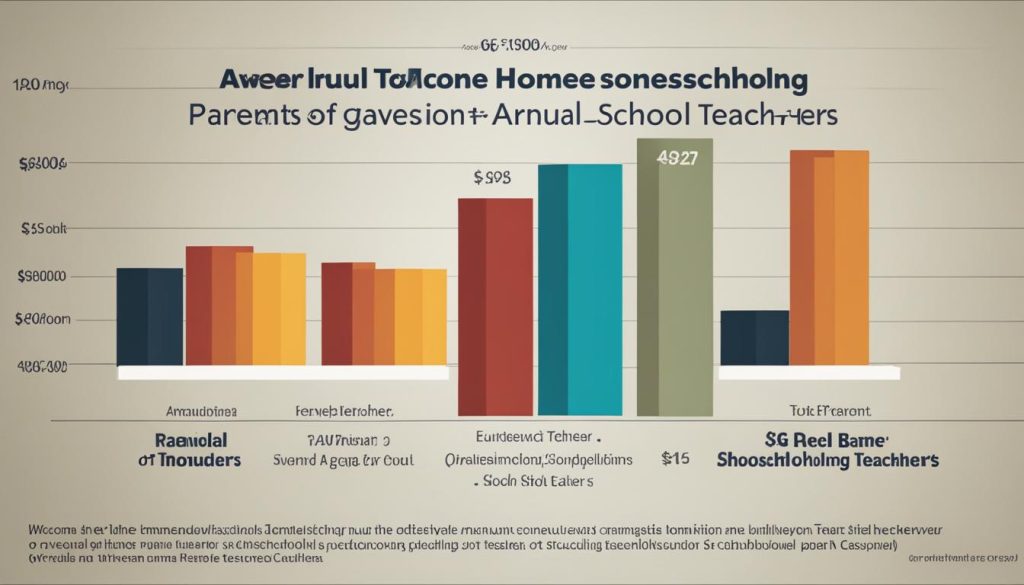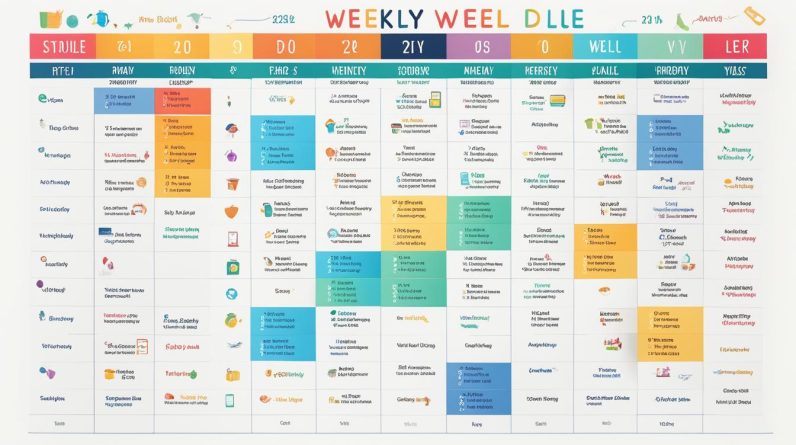Are you considering homeschooling your child? Perhaps you’ve heard rumors about financial compensation or reimbursement for homeschooling expenses. Let’s dive into the topic and explore whether you can receive payment for homeschooling in the United States.
While homeschooling your child is a personal choice and a responsibility undertaken by parents, there are certain financial incentives available in some states. These incentives can help alleviate some of the financial burdens associated with homeschooling.
Skeptical? Let’s get straight to the point. The government does not pay for homeschooling. However, some states offer educational funds, which may include tax credits, deductions, or stipends, for families who choose to homeschool their children under an umbrella school such as a charter school.
Now, you may be wondering, what exactly are the financial support options available? Let’s take a closer look:
Key Takeaways
- Homeschooling is a personal choice, and parents do not get paid to homeschool their children.
- In some states, families may receive tax credits, deductions, or stipends if they homeschool under an umbrella school like a charter school.
- The government does not provide direct funding for homeschooling in the United States.
- Some states do offer educational funds for homeschooling, varying in amount and availability.
- It is essential to check your state’s homeschooling laws to understand any potential financial incentives or benefits available.
As you embark on your homeschooling journey, it’s crucial to have a clear understanding of the financial aspects involved. Researching your state’s laws and regulations will help you navigate any potential funding options or incentives.
Remember, while financial support can provide relief, ultimately, the responsibility of covering homeschooling expenses lies with the parents or guardians. Proper budgeting and planning can help ensure a successful homeschooling experience for you and your child.
So, as you prepare to embark on this educational adventure, put your misconceptions aside and focus on providing a rich and rewarding learning experience for your child. The joy of homeschooling comes from the love of learning and the unique opportunity to tailor education to suit your child’s individual needs.
Does the Government Pay for Homeschooling?
In the United States, the government does not directly pay for homeschooling. However, there are alternative options available for families who prefer to educate their children at home.
One such option is public schools that offer schooling from home programs. These programs provide a structured curriculum that aligns with the state educational requirements and standards. Students receive instruction and support from certified teachers, and their progress is monitored to ensure they meet the necessary learning objectives.
Unlike traditional homeschooling, these programs are considered public school education. As a result, the costs are covered in the same way as any other public school education. This means that the government provides funding to support the program, and families do not have to bear the financial burden on their own.
It is important to note that the availability of schooling from home programs may vary by state and school district. Therefore, it is crucial to research the options and requirements specific to your area to determine if this type of education is available.
Additionally, while the government does not directly pay for homeschooling, some states may offer educational funds for homeschooling. These funds are not provided by the government but may be allocated through state-specific programs. The availability and amount of funding can vary by state, so it is essential to explore the homeschooling funding sources that exist in your region.
Overall, while the government does not pay for homeschooling in the traditional sense, there are alternatives such as public schools’ schooling from home programs and potential state funding options that can help families finance their child’s education.
By exploring these alternatives, parents can find the best educational path for their children while ensuring they have the necessary financial support.
Advantages of Public Schools’ Schooling from Home Programs:
- Structured curriculum aligned with state standards
- Instruction and support from certified teachers
- Monitoring of student progress
- Government-funded education
State-specific Homeschooling Funding Sources:
- Educational funds allocated by the state
- Grants for homeschooling provided by private organizations
- Scholarships for homeschooling programs
How Much Do Parents Get Paid to Homeschool?
If a state offers educational funds for homeschooling, the amount parents get paid varies according to the state. The stipend for homeschooled students can range from a few hundred dollars to several thousand dollars. For example, in California, the educational fund previously had a stipend of up to $2,600 per year. The specific amount of state funding for homeschooling varies, so it is important to check your state’s homeschooling laws and inquire about any potential funding available.
State Funding for Homeschooling Stipends
State funding for homeschooling can provide financial support to families who choose to educate their children at home. While the amount parents receive may differ between states, these stipends aim to alleviate some of the financial burden associated with homeschooling. It’s important to keep in mind that not all states offer monetary support for homeschooling, and the availability of funds may change over time. Be sure to stay updated with your state’s educational policies and regulations.
In addition to stipends, some states may provide other forms of financial assistance for homeschooling, such as reimbursements for educational materials or resources. These resources can help parents provide a well-rounded education for their children while managing the associated costs.
It’s crucial to note that state funding for homeschooling is not a universal practice. Each state has its own criteria, eligibility requirements, and funding amounts. Some states may have strict qualifications that determine whether a family is eligible for financial assistance, while others may offer more flexible options. Researching and understanding your state’s specific homeschooling laws will provide you with the information you need to explore potential funding opportunities.
Case Study: Stipend for Homeschooled Students in California
One example of state funding for homeschooling can be seen in California. The California Department of Education previously allocated a stipend for homeschooled students. This stipend provided financial support to families who chose to homeschool their children under the private school affidavit option.
| State | Stipend Amount | Educational Funding Program |
|---|---|---|
| California | $2,600 per year | Private School Affidavit (PSA) |
The stipend of up to $2,600 per year in California was intended to assist families with the costs associated with homeschooling. It’s important to note that this amount is subject to change and may vary depending on the availability of funds and the state’s educational budget.
To determine if your state offers any form of financial support or stipend for homeschooling, visit your state’s official education website or contact your local homeschooling organizations or support groups. They can provide you with valuable information and resources regarding available funding opportunities.

Do You Get a Tax Credit for Homeschooling?
If you are considering homeschooling your child, you may be wondering if there are any tax benefits or credits available to help offset the costs. While some states do offer tax credits or deductions for homeschooling expenses, it’s important to note that the laws regarding these benefits can vary and are subject to change. Additionally, federal tax deductions do not typically apply to homeschooling expenses. The IRS reserves deductions for homeschooling supplies for higher education expenses beyond high school.
To fully understand the tax implications of homeschooling in your state, it’s best to consult with a tax professional who is knowledgeable about homeschooling laws and regulations. They can help you navigate any available tax credits or deductions specific to your state, as well as guide you through the process of claiming these benefits on your tax return.
While tax credits and deductions for homeschooling may not be widely available, it’s important to consider other potential financial benefits such as state-specific tax deductions that may be applicable to your homeschooling expenses. These deductions can vary from state to state, so it’s essential to familiarize yourself with the tax laws in your particular state.
The Importance of Consulting a Tax Professional
Given the complexities surrounding tax credits and deductions for homeschooling, it’s crucial to seek professional advice to ensure compliance with state and federal tax regulations. A tax professional can provide you with personalized guidance based on your unique circumstances and help you make the most of any available tax benefits.
Consulting with a tax professional well-versed in homeschooling laws is highly recommended. They can provide accurate and up-to-date information regarding the tax credits and deductions that may be available to you.

| State | Tax Credit | Tax Deduction |
|---|---|---|
| California | No | No |
| Texas | No | Yes |
| Florida | Yes | No |
| New York | No | No |
| Ohio | No | Yes |
This table provides a brief overview of the tax credits and deductions for homeschooling in selected states. Please note that this table is not exhaustive and should not be considered as legal or tax advice. It merely serves as an example to highlight the variation in tax benefits for homeschooling across different states.
Understanding the Cost of Homeschooling
Homeschooling can be a rewarding educational choice for many families. However, it’s important to understand the financial implications that come with homeschooling. The cost of homeschooling can vary depending on several factors, including curriculum choices, extracurricular activities, and homeschool supplies.
One of the first expenses to consider is the curriculum. There are a wide variety of curriculum options available, ranging from free online resources to comprehensive pre-packaged curricula that come with a price tag. The cost of curriculum materials can range from a few hundred dollars to several thousand dollars per year, depending on your preferences and the grade level of your child.
Extracurricular activities can also add to the overall cost of homeschooling. While some activities may be free or offered at a minimal cost, others, such as sports teams, music lessons, or art classes, may require additional fees. It’s important to budget for these activities if your child wants to participate in them.
Another expense to consider is homeschool supplies. These include textbooks, workbooks, art supplies, science materials, and any other resources you may need for your homeschooling journey. The cost of supplies will vary depending on the grade level and specific requirements of your curriculum.
Additionally, it’s crucial to be aware of any potential stipulations or requirements regarding homeschooling expenses in your state. Each state’s homeschooling laws differ, and some states may have specific regulations regarding what expenses are eligible for reimbursement or tax deductions.
Proper budgeting and planning can help families manage the costs associated with homeschooling. By estimating the expenses for curriculum, extracurricular activities, and supplies, you can create a homeschooling budget that aligns with your family’s financial situation. It’s also helpful to explore cost-saving strategies, such as buying used curriculum materials or taking advantage of free educational resources available online.
“Homeschooling allows for flexibility and personalized education, but it’s essential to consider the financial aspect as well. By understanding the cost factors and implementing a budget, you can ensure that homeschooling remains a sustainable and enriching experience for your family.”
| Expenses | Average Cost Range |
|---|---|
| Curriculum | $200 – $2,000+ |
| Extracurricular Activities | $0 – $500+ |
| Homeschool Supplies | $100 – $500+ |
While homeschooling expenses can add up, it’s important to remember that there are no federal tax deductions for homeschooling expenses. However, some states may offer tax credits, deductions, or educational funds that can help offset the cost. It’s advisable to research your state’s specific requirements and any potential financial incentives that may be available to homeschooling families.
By carefully considering and managing the cost of homeschooling, you can create an enriching educational experience for your child while staying within your budget.

Are there Grants for Homeschooling?
If you’re a homeschooling family facing financial hardships, you may be wondering if there are grants available to assist you. The good news is that there are homeschool state grants and homeschool federal grants offered by private organizations to support homeschooling families. These grants provide financial assistance to help cover various homeschooling expenses.
It’s important to note that the availability and eligibility criteria for homeschooling grants may vary depending on the organization and the specific needs of your family. Some grants may be specific to certain states, while others may be offered at a federal level. Therefore, it is advisable to search for grants that align with your specific requirements and circumstances.
Benefits of Homeschooling Grants
Obtaining a homeschooling grant can provide significant benefits to your homeschooling journey. These grants can help alleviate some of the financial burdens associated with homeschooling, making it more accessible and affordable for families. With the financial support from grants, you can:
- Invest in high-quality curriculum and educational resources
- Participate in educational activities, field trips, and enrichment programs
- Access online learning platforms and educational technology
- Engage in extracurricular activities and classes
- Attend homeschool conventions, workshops, and conferences
“Homeschooling grants provide financial assistance to homeschooling families, helping them overcome financial barriers and enhance their homeschooling experience.”
Applying for Homeschooling Grants
When applying for homeschooling grants, it’s essential to carefully review the eligibility criteria and requirements set by the granting organization. Be prepared to provide necessary documentation and information supporting your financial need and homeschooling goals.
Additionally, keep in mind that homeschooling grants may have specific application periods or deadlines. Stay organized and plan ahead to ensure you don’t miss any opportunities. It may also be beneficial to explore local resources, homeschooling associations, and online communities for potential grant opportunities and guidance in the application process.
Examples of Homeschooling Grants
| Grant Name | Description | Eligibility | Funding Amount |
|---|---|---|---|
| ABC Homeschool Grant | Provides financial assistance to homeschooling families in need of curriculum resources. | Open to families in all states | $500 – $1,000 |
| Education for All Foundation Grant | Offers grants to support homeschooling families’ educational expenses, including materials, classes, and activities. | Available to families in specific states | $1,000 – $2,500 |
| Homeschooling Assistance Fund | Provides financial aid for homeschooling families facing temporary financial difficulties. | Open to families in all states | Up to $5,000 |
Note: The above examples are fictional and intended for illustrative purposes only. Actual grants may have different names, requirements, and funding amounts.
Remember, securing a homeschooling grant can significantly impact your homeschooling experience by providing financial support and resources. Explore available grants, stay organized, and apply early to increase your chances of receiving assistance.

Who Pays for Homeschooling?
When it comes to homeschooling, the responsibility for paying for your child’s education falls on you as the parent or guardian. Unlike public schools where the government covers the costs, homeschooling is considered a private choice. While there may be certain financial incentives available such as stipends, deductions, or grants, it is ultimately up to the family to bear the expenses associated with homeschooling.
Financial Responsibility
As a homeschooling parent, it’s important to consider the financial aspects and plan accordingly. Here are a few key points to keep in mind:
- Homeschooling Expenses: You’ll need to budget for curriculum materials, textbooks, online resources, and any other educational materials necessary for your child’s homeschooling journey.
- Extracurricular Activities: If your child wants to participate in sports, music, art, or other extracurricular activities, you’ll need to factor in the costs and fees associated with these pursuits.
- Field Trips and Educational Outings: Homeschooling often involves exploring the world beyond textbooks. Consider the costs of field trips, museum visits, and other educational outings that enrich your child’s learning experience.
- Testing and Assessment: Some states require standardized testing or assessment for homeschooled students. Familiarize yourself with any associated costs that may arise from these requirements.
By carefully planning and budgeting, you can ensure that you provide your child with a quality homeschooling experience while managing the associated costs.
“While homeschooling is a private choice, it’s essential to understand that parents are responsible for covering the expenses. However, there may be financial assistance available in the form of stipends, deductions, or grants.”
Exploring Financial Assistance
Although parents are primarily responsible for the financial obligations of homeschooling, it’s worth exploring potential avenues for assistance. Here are a few options to consider:
- Stipends: Some states offer stipends or educational funds for homeschooling families. These amounts can vary, so it’s important to research the specific opportunities available in your state.
- Deductions and Tax Credits: While federal tax deductions do not apply to homeschooling expenses, some states may offer tax credits or deductions for homeschooling-related costs. Consult with a tax professional or research your state’s tax laws for potential benefits.
- Grants: Private organizations and foundations may offer grants specifically tailored to assist homeschooling families. Investigate grants that align with your needs and circumstances.
Remember to check your state’s homeschooling laws and regulations to ensure you don’t miss out on potential financial assistance opportunities.
Homeschooling Laws in California
Are you considering homeschooling your child in California? Understanding the homeschooling laws in California is crucial to ensure compliance and a successful homeschooling journey. In California, parents have several options for homeschooling their children, each with its own set of requirements and responsibilities.
Enrolling in Existing Schools
One option is to enroll your child in an existing private school, public charter school, or independent study program. By doing so, you can leverage the resources and support provided by these institutions while still taking an active role in your child’s education. Each school may have its own admission process and requirements, so it is important to research and find the best fit for your child.
Starting a Private Home-Based School
Another option in California is to open your own private home-based school. To do this, you will need to file the Private School Affidavit (PSA) with the California Department of Education (CDE). The PSA serves as a declaration that you are establishing a private school in your home. This step is necessary to comply with homeschooling laws in California.
Once you have filed the PSA, you become responsible for all aspects of your child’s education. This includes selecting and providing all curricular, instructional, and other materials necessary for their education. You have the freedom to choose the curriculum that best suits your child’s needs and learning style.
It is important to note that the CDE does not provide guidance on how to homeschool. However, there are many online resources available, including California homeschool organizations and local homeschool groups, where you can find support, advice, and recommendations to enhance your homeschooling journey.
| Option | Requirements | Responsibilities |
|---|---|---|
| Enrolling in Existing Schools | Admission process and requirements of the chosen school | Collaborate with the school and actively participate in your child’s education |
| Starting a Private Home-Based School | File the Private School Affidavit (PSA) with the CDE | Select and provide all necessary curricular materials and assume full responsibility for your child’s education |
Remember, homeschooling is a significant responsibility, and you have the privilege of shaping your child’s education. Understanding the homeschooling laws in California and fulfilling your curriculum selection responsibility will help you create a tailored and enriching learning experience for your child.
Homeschooling Laws in Ohio
If you’re considering homeschooling your child in Ohio, it’s important to understand the homeschooling laws in the state. Ohio requires parents interested in homeschooling to notify their local school district superintendent and fulfill the requirements outlined in Ohio law. Once the notification is received, your child will be released from compulsory school attendance, allowing you to proceed with homeschooling.
One of the key responsibilities of homeschooling parents in Ohio is the selection of the curriculum and course of study for their children. As a homeschooling parent, you have the freedom to choose the educational materials and resources that align with your child’s needs and learning goals.
It’s important to note that unlike some other states, Ohio does not provide state financial assistance for homeschooling. This means that the financial responsibility for homeschooling rests solely on the parents. However, there are various resources available to help you navigate the curriculum selection process and find affordable or free educational materials for your homeschooling journey.
By understanding the homeschooling laws in Ohio and shouldering the responsibility of curriculum selection, you can provide your child with a tailored education that meets their unique needs and fosters their academic growth and development.
Online or Virtual Learning for Homeschooling
When it comes to homeschooling in Ohio, online schools are often a topic of discussion. While online schools may seem like a convenient option for home education, it’s important to understand that they are not considered homeschooling under Ohio law.
Online schools fall under the category of internet-based community schools or district-operated online learning schools. These schools have their own set of rules, regulations, and requirements separate from traditional homeschooling.
If you choose to enroll your child in an online school that is based out of state, it is essential to notify your district of residence. Informing the district about your child’s enrollment in an out-of-state online school ensures compliance with Ohio’s educational regulations and reporting requirements.
It’s important to note that online schools provide structured virtual learning experiences with predetermined curricula and instructional methods. If you prefer a more flexible and customized approach to home education, traditional homeschooling may be a better fit for your family.
Home Education versus Online Schools
While both home education and online schools provide alternative educational options, there are important distinctions to consider. Home education allows parents the freedom to tailor their child’s learning experience, choosing curriculum, pacing, and methods that align with their educational goals and values. It offers a highly individualized approach with a focus on family involvement and personalized learning.
In contrast, online schools offer a structured virtual learning environment with predetermined curricula and instructional methods. Students in online schools typically follow a set schedule, submit assignments online, and interact with teachers and classmates virtually. While online schools can provide a more structured approach, they may not offer the same level of flexibility and customization as traditional homeschooling.
When deciding between home education and online schools, it’s essential to consider your family’s needs, preferences, and educational goals. Understanding the differences will help you make an informed decision that best serves your child’s educational journey.
| Home Education (Homeschooling) | Online Schools |
|---|---|
| Highly individualized approach | Structured virtual learning environment |
| Flexible curriculum and pacing | Pre-determined curricula |
| Family involvement and personalized learning | Virtual interactions with teachers and classmates |
| Freedom to choose instructional methods | Follows a set schedule |
Sports and Other Activities for Homeschooled Students
Homeschooled students in some states, including Ohio, have the opportunity to participate in extracurricular activities offered by public schools. These activities provide homeschooled students with the chance to engage in sports and other social and educational experiences. By joining these activities, homeschooled students can develop new skills, form friendships, and enhance their overall educational journey.
Eligibility for Public School Activities:
To participate in public school extracurricular activities, homeschooled students must meet certain eligibility requirements established by the school district. These requirements may include age restrictions, residency verification, and compliance with academic standards. It is essential for parents to inquire with their local school district about the specific eligibility criteria and any associated fees.
Benefits of Extracurricular Activities:
- Physical Health: Sports activities promote physical fitness and overall well-being.
- Social Skills: Group activities provide opportunities for teamwork, communication, and collaboration.
- Personal Growth: Extracurricular activities help students develop leadership, time management, and problem-solving skills.
- Expanded Education: Participation in activities such as music, art, or drama can enhance a homeschool curriculum.
“Extracurricular activities offer homeschooled students the chance to engage in a variety of experiences that complement their academic journey and promote personal development.” – John Smith, Homeschooling Parent
Supportive State Laws:
States like Ohio have implemented laws that allow homeschooled students to participate in public school extracurricular activities. These laws recognize the importance of providing equal opportunities for all students, regardless of their educational setting. By allowing homeschooled students to join these activities, states encourage a sense of inclusivity and foster a well-rounded educational experience.
Examples of Public School Activities for Homeschooled Students in Ohio
| Activity | Description |
|---|---|
| Varsity Sports | Homeschooled students can join public school varsity sports teams, competing against other schools in a variety of sports including soccer, basketball, and track and field. |
| Clubs and Organizations | Homeschooled students can participate in clubs and organizations offered by public schools, such as debate clubs, science clubs, or student government. |
| Music and Performing Arts | Public schools often provide opportunities for homeschooled students to participate in music ensembles, band, choir, and theater productions. |
Homeschooled students should reach out to their local school district to inquire about the specific extracurricular activities available and the process for participation. Engaging in these activities can enrich the homeschooling experience and provide homeschooled students with a well-rounded education.
Ohio High School Diploma for Homeschooled Students
Ohio law recognizes the efforts of homeschooled students by allowing some of them to receive high school diplomas. If you are homeschooling in Ohio, it’s important to understand the specific requirements for eligibility, which can be found in section 3313.6110 of the Ohio Revised Code.
While traditional high school diplomas are an option, homeschooled students in Ohio also have alternative routes to obtaining a diploma. They can choose to pursue diploma equivalencies, such as the General Education Development (GED) Test and the California High School Proficiency Exam (CHSPE).
Whether you opt for a traditional diploma or an alternative equivalency, it’s crucial to consult the relevant statutes and regulations to fully understand the options available to you as a homeschooled student seeking a high school diploma in Ohio.
FAQ
Do you get paid to homeschool your child?
No, homeschooling your child is a private choice, and parents do not get paid to homeschool their children.
Does the government pay for homeschooling?
No, the government does not pay for homeschooling in the United States. However, there are public schools that offer schooling from home options, and the costs are covered in the same way as any other public school education.
How much do parents get paid to homeschool?
The amount parents get paid to homeschool varies by state. Some states offer educational funds for homeschooling, and the stipend for homeschooled students can range from a few hundred dollars to several thousand dollars per year. The specific amount of state funding for homeschooling varies, so it is important to check your state’s homeschooling laws and inquire about any potential funding available.
Do you get a tax credit for homeschooling?
While some states may allow for tax credits or deductions for homeschooling, federal tax deductions do not apply to homeschooling expenses. According to the IRS, deductions for homeschooling supplies are reserved for higher education beyond high school. It is important to consult with a tax professional and familiarize yourself with your specific state’s tax laws to understand if there are any tax credits or deductions available for homeschooling expenses.
What is the cost of homeschooling?
The cost of homeschooling varies depending on factors such as curriculum choices, extracurricular activities, and homeschool supplies. Each state’s homeschooling laws differ, so it is essential to research and understand your state’s specific requirements and any potential stipulations for homeschooling expenses. Proper budgeting and planning can help families manage the costs associated with homeschooling.
Are there grants for homeschooling?
Yes, there are homeschool state grants and homeschool federal grants available to homeschoolers from private organizations. These grants are often designed to assist homeschooling families who are facing financial hardships. It is advisable to search for homeschooling grants that align with your specific needs and circumstances.
Who pays for homeschooling?
Since homeschooling is a choice, parents or guardians are responsible for paying for homeschooling. While there may be stipends, deductions, or grants available, it is ultimately the family’s responsibility to cover the expenses associated with homeschooling.
What are the homeschooling laws in California?
In California, parents may choose to homeschool their children by either enrolling them in an existing private school, a public charter or independent study program, or by opening their own private home-based school and filing the Private School Affidavit (PSA) with the California Department of Education (CDE). Homeschooling laws in California require parents to select and provide all curricular, instructional, and other materials. The CDE does not provide guidance on how to homeschool, but there are various resources available online, including California homeschool organizations and local homeschool groups.
What are the homeschooling laws in Ohio?
In Ohio, parents interested in homeschooling their children must notify their local school district superintendent and meet the requirements of Ohio law. Once the notification is received, the student is released from compulsory school attendance. Parents in Ohio have the responsibility of choosing the curriculum and course of study for their homeschooling. It is important to understand that there is no state financial assistance available for homeschooling in Ohio.
Is online or virtual learning considered homeschooling?
No, online schools are not considered homeschooling in Ohio. They fall under the category of internet-based community schools or district-operated online learning schools. If a student is enrolled in an online school based out of state, parents must notify their district of residence that the student will be attending an out-of-state school. Online schools are separate from traditional homeschooling and have their own set of regulations and requirements.
Can homeschooled students participate in sports and other activities?
Yes, homeschooled students in some states, including Ohio, can participate in extracurricular activities offered by public schools. These activities are considered extracurricular and are run by the school district. Eligibility requirements and fees may apply. Parents should check with their local school district to understand the opportunities available for homeschooled students to participate in sports and other activities.
Can homeschooled students receive a high school diploma in Ohio?
Yes, Ohio law allows for some homeschooled students to receive diplomas. Specific requirements for eligibility can be found in section 3313.6110 of the Ohio Revised Code. Homeschooled students in Ohio also have the opportunity to pursue alternative diploma equivalencies such as the General Education Development (GED) Test and the California High School Proficiency Exam (CHSPE). It is important to consult the relevant statutes and regulations to understand the options available for homeschooled students to obtain a high school diploma in Ohio.






